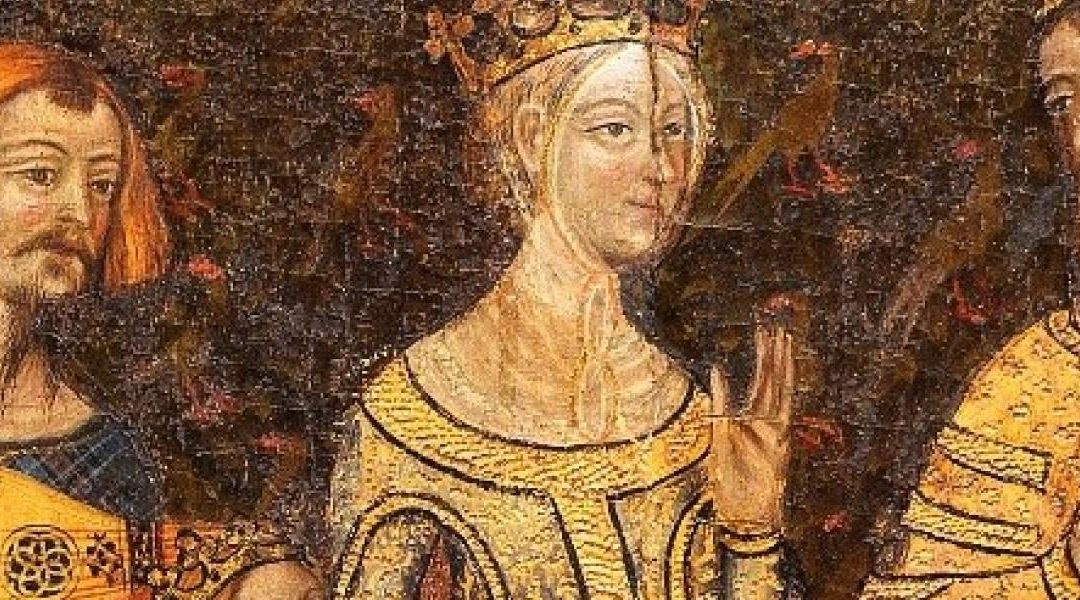—Physician to popes and kings, reformer of the teaching of medicine at the beginning of the fourteenth century, prolific writer, diplomat and theologian in search of a new Christianity.—
Arnau de Vilanova is undoubtedly one of the most appealing characters in medieval European history, both for his own merits and for the features that posterity has given him. He was one of the most outstanding physicians of his time for his work, university teaching and professional activity. He was also a controversial theologian, reproved and persecuted by professional theologians, but appreciated and followed by the most reformist currents within the Church. Some of the kings and popes of the time competed for his medical services and entrusted him with diplomatic missions. He was a physician to the monarchs of the Crown of Aragon, Peter III, Alfonso II, James II and his wife, queen Blanca, and Frederick of Sicily. Moreover, he occasionally offered his services to Philip IV of France, and the kings of Naples, Charles II and Robert I, as well as the pontiffs Boniface VIII, Benedict XI and Clement V.
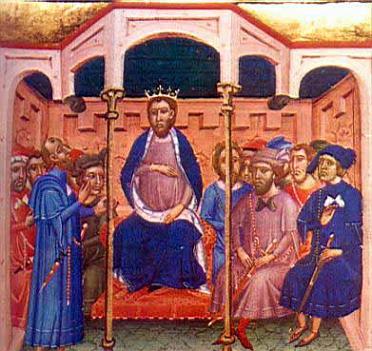
James II presiding over the Courts of Barcelona, Llibre Verd de Barcelona. Wikipedia.
Following his death, an ecclesiastical sentence condemned some of his theological theses, which were forgotten. Instead, his fame as a doctor continued to grow over time and his figure became shrouded in legend. Today, this legendary image of Arnau de Vilanova still survives, formed from the distortion of his memory and the numerous writings that were falsely attributed to him. In fact, too often the traditional image of Arnau as an alchemist, astrologer, empirical physician or introducer of alcohol distillation continues to be repeated, despite the fact that research in recent decades has disproved all these false attributions and given us back his historical figure.
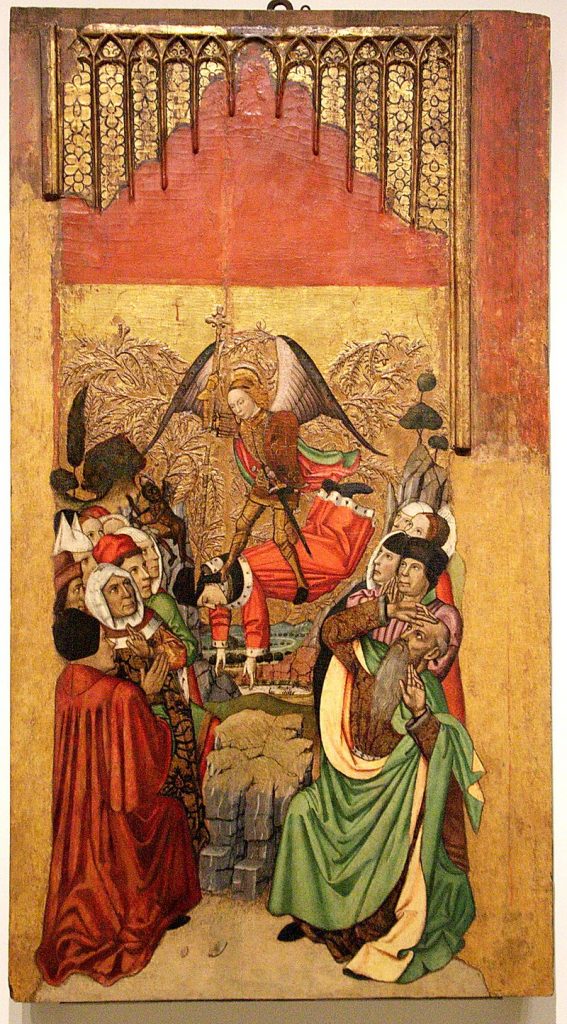
Saint Michael defeats the Antichrist. Jaume Huguet, altarpiece of Santa Maria del Pi in Barcelona, MNAC, 1455-1460. Wikipedia.
Arnau de Vilanova was born around 1240, but his birthplace has been the subject of discussion since the Middle Ages; Valencia, Catalonia, Languedoc and Provence have claimed him as a son for centuries. Currently, there is no doubt that he was originally from one of the kingdoms of the Crown of Aragon, since contemporary witnesses give him the nickname of ‘Catalan’. Arnau was closely linked to the city of Valencia, where he settled his family shortly after the conquest of James I. In this diocese, he received minor orders, as shown by Pope Clement V referring to him as ‘clergyman of the diocese of Valencia’. In his inventory of goods there were references to the papal privilege to be able to celebrate the Eucharist in a private oratory, and in his house there was a chapel with an altar, the different liturgical objects needed, as well as a silver cross – a gift from the pope, a Bible in Hebrew, the Gospels and other books of a religious nature. In short, religion was an important part of Arnau’s life, he devoted deep attention to it and this was clearly reflected in his work.
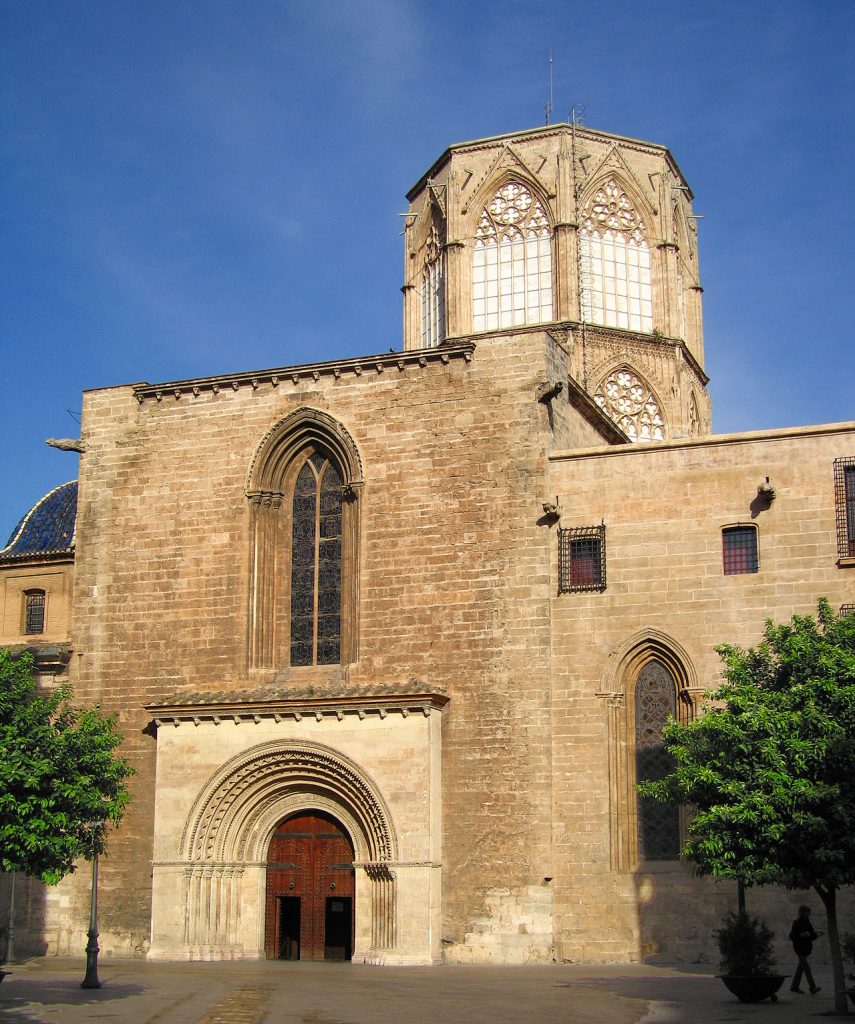
L’Almoina door and dome of Valencia Cathedral (13th-14th centuries). Wikipedia.
It is likely that he learned the Arab language from the many Arabs who remained in the Kingdom of Valencia at that time, a fact that would be crucial in his career. From 1260, he studied medicine at Montpellier until he obtained the title of master. He also took advantage of his stay to study a semester of theology in the Dominican convent. In Montpellier he met his wife, Agnès Blasi, with whom he had a daughter, Maria, who would eventually enter the convent of Santa Maria Magdalena in Valencia. Between 1276 and 1281, Arnau de Vilanova lived in Valencia, a city where he owned properties and seemed to be well rooted. In fact, when absent, he had to resort to various solicitors to manage his assets and affairs in the Valencian capital. Among them was Bernat Desclapers, who would eventually found the hospital of Santa Maria, better known as the d’En Clapers, probably at the initiative of Arnau himself.
In 1281, King Peter II named him court physician, perhaps thanks to the Bishop of Valencia, Jaspert de Botonac, to whom Arnau had dedicated an epistle against necromancy. Thus, a new period began in Barcelona that would last until the death of the king in 1285. During this period, he studied Hebrew with Ramon Martí and translated works by Galen from Arabic into Latin. It is possible that his translation of the Canon by Avicenna was from the same time, while the De medicinis simplicibus by Abū-s-Salt of Denia seems earlier. After the death of the king, who he attended during the illness that took him to the grave, he remained linked to the new king, Alfonso, as a physician but returned to Valencia between 1285 and 1290.
Approximately between 1290 and 1300, Arnau was professor of medicine at Montpellier, at that time the most prestigious medical school in Latin Europe. The main contribution he made as an author and teacher was to tackle the problems that medical science could not answer in his time. This was done from the exploration and development of Greek-Arab medicine, which was increasingly becoming appreciated and assimilated in European faculties of medicine. This discipline was based on the teachings of the Greek physician, Galen, who was born in Pergamon and practised in Rome (129-210/216 AD). Galen developed a medical synthesis based on the Hippocratic tradition, Aristotle and other writers, but also on his own research and clinical experience. His vast works formed the basis of Galenism, a movement that began in Antiquity and continued to be the dominant current in learned medicine until the seventeenth century.
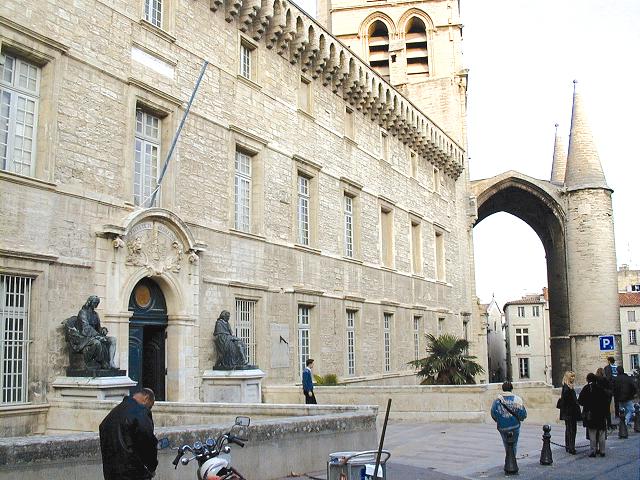
Montpellier Faculty of Medicine, a university founded in 1220. Wikipedia.
Arnau emphasised the need to understand Galen not through Arab writers, but from the Roman author’s own words. He sought to renew the educational programme of his university by overcoming the influence of Avicenna’s Canon, directly seeking the contributions of Hippocrates and Galen. The Arnaldian understanding of medicine as a technique based on the system of medieval sciences distanced it from a simple empirical practice and at the same time preserved its independence from natural philosophy. Thus, he became the instigator of the reform of Montpellier’s medical studies programme. This adapted Galenism (‘New Galen’) was recognised and made official by the new curriculum approved by Clement V, with Arnau de Vilanova’s advice, in 1309. Our physician’s stay in Montpellier undoubtedly left a deep impression, which can be followed to at least the fifteenth century.
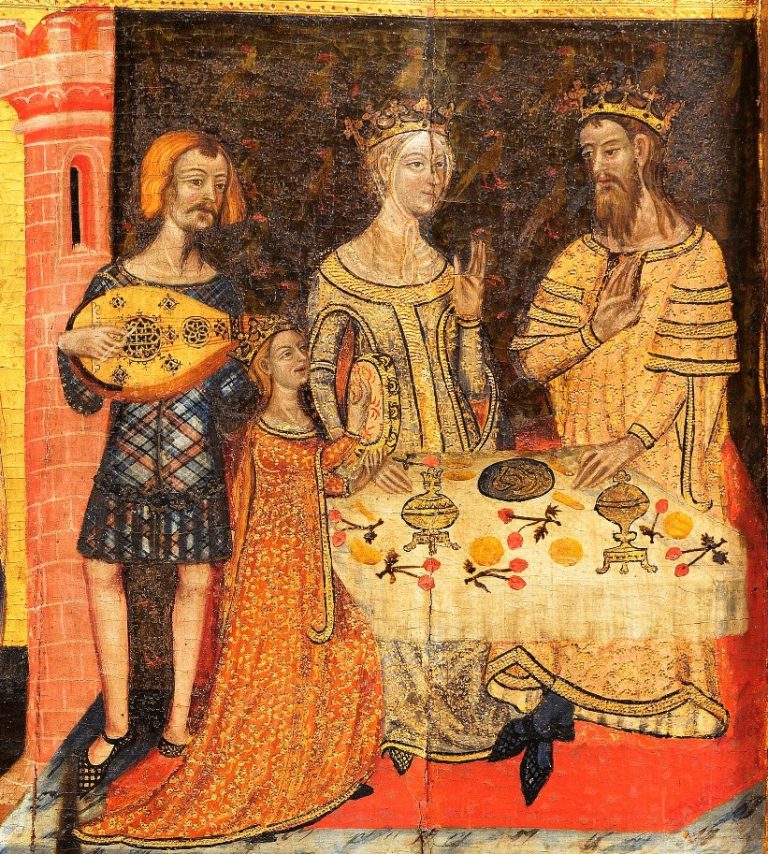
Lunch of the kings Peter the Ceremonious, Eleonor of Sicily and the Infanta Eleonor of Aragon, with minstrels. Altarpiece of Saints John, from Santa Coloma de Queralt, MNAC, ca. 1356. Sciència.
Among his other works, Arnau de Vilanova was the author of a popular treatise, the Regimen Sanitatis ad regem Aragonum, which was written for James II between 1305 and 1308 and would be translated into Catalan around 1310 by the surgeon Berenguer Sarriera. Texts that encouraged staying healthy and fighting disease enjoyed great popularity among bourgeois and noble readers, mostly non-medical, who saw them as a useful instrument in their lives. In the thirteen chapters of the Regimen, the reader could obtain information on how to handle so-called ‘unnatural things’ (ambient air, exercise and rest, bathing, food and drink, sleep and waking, excess and intercourse, and matters of the soul) to achieve a balance that maintained health. The continuous translation of this text into different Romance languages is explained by the social demand for this genre. The treatise also enjoyed popularity among the Jews, as it was translated into Hebrew. In short, this diffusion shows the importance of the introduction of medical knowledge in a society increasingly concerned with how to solve its health problems through the acquisition of books of a modest size and style, for daily use rather than for the enjoyment of their illuminated codices.
The last years (1305-1311) of Arnau’s life were quite busy, with constant travelling. He travelled to Barcelona, Avignon, Sicily, Naples and Almería. He still had time to attend patients such as the kings of the Crown of Aragon, Pope Clement V and King Charles of Naples and to dedicate himself to writing medical works. He died in early September 1311 during a sea voyage, near the coast of Genoa. At that time, he was a well-known physician with a personal fortune built by the countless donations received from the illustrious figures he had served throughout his life. However, above all he had left an immense and prolific body of work consisting of about thirty treatises on medicine and about sixty on spirituality and theology.
Carmel Ferragud
IILP-UV
How to cite this paper:
Ferragud, Carmel. Monasteries and universities. Sabers en acció, 2020-11-18. https://sabersenaccio.iec.cat/en/arnau-de-vilanova-en/.
Find out more
You can find further information with the bibliography and available resources.
Recommended reading
McVaugh, Michael R. Arnau de Vilanova. En: Vernet, Joan; Parés, Ramon, eds. La ciència en la història dels Països Catalans. Vol. 1: Dels àrabs al Renaixement, Valencia: Institut d’Estudis Catalans – Universitat de València; 2004, p. 443-453.
Mensa i Valls, Jaume. 1997. Arnau de Vilanova. Barcelona: Rafael Dalmau; 1997.
Paniagua, Juan Antonio. Studia arnaldiana: trabajos en torno a la obra médica de Arnau de Vilanova, c. 1240-1311. Barcelona: Fundación Uriach 1838; 1994.
Studies
Batllori, Miquel. Arnau de Vilanova i l’arnaldisme. Valencia: Tres i Quatre; 1994.
Cifuentes, L. 2006. La ciència en català a l’edat mitjana i el Renaixement. Barcelona-Palma de Mallorca: Universitat de Barcelona-Universitat de les Illes Balears; 2006. 2 ed.
Giralt, Sebastià. The Legend of Arnau de Vilanova, from the Middle Ages to the Early Modern Times. En: Paravicini Bagliani, Agostino, ed. The Medieval Legends of Philosophers and Scholars. Florencia: SISMEL-Edizioni del Galluzzo (Micrologus: Natura, Scienze e Società Medievali, 21), 2013, p. 411-444.
Perarnau, Josep, ed. Actes de la I Trobada Internacional d’Estudis sobre Arnau de Vilanova. Barcelona: Institut d’Estudis Catalans; 1995, 2 vols.
Perarnau, Josep, ed. Actes de la II Trobada Internacional d’Estudis sobre Arnau de Vilanova. Barcelona: Institut d’Estudis Catalans; 2005.
Perarnau, Josep, ed. Actes de la III Trobada Internacional d’Estudis sobre Arnau de Vilanova. Barcelona: Institut d’Estudis Catalans; 2014.
Ziegler, Joseph. Medicine and Religion c. 1300: The Case of Arnau de Vilanova. Oxford: Clarendon Press; 1998.
Sources
Medical work:
Arnaldi de Villanova Opera Medica Omnia (AVOMO). Barcelona: Universitat de Barcelona-Fundació Noguera. Volúmenes publicados:
II. Aphorismi de gradibus, ed. M.R. McVaugh (1975).
III. De amore heroico / De dosi tyriacalium medicinarum, ed. M.R. McVaugh (1985).
IV. De consideracionibus operis medicine sive de flebotomia, ed. L. Demaitre i P. Gil-Sotres (1988).
V.1. De intencione medicorum, ed. M.R. McVaugh (2000).
V.2. Tractatus de humido radicali, ed. M.R. McVaugh, C. Crisciani; G. Ferrari (2010). VI.1. Medicationis parabole, ed. J.A. Paniagua / Pirqé Arnau de Vilanova, ed. L. Ferre; E. Feliu (1990).
VI.2. Commentum in quasdam parabolas et alias aphorismorum series, ed. J.A. Paniagua i P. Gil-Sotres (1993).
VII.1. Epistola de reprobacione nigromantice ficcionis (De improbatione maleficiorum), ed. S. Giralt (2005).
X.1. Regimen sanitatis ad regem Aragonum, ed. L. García-Ballester; M.R. McVaugh; P. Gil-Sotres (1996).
X.2. Regimen Almarie, ed. M.R. McVaugh; L. Cifuentes (1998).
XI. De esu carnium, ed. D. Bazell (1999).
XIV. Expositio super aphorismo Hippocratis In morbis minus – Repetitio super aphorismo Hippocratis Vita brevis, ed. M.R. McVaugh; F. Salmón (2014).
XV. Commentum supra tractatum Galieni de malicia complexionis diverse, ed. L. García-Ballester; E. Sánchez Salor / Doctrina Galieni de interioribus, ed. R. Durling (1985).
XVI. Translatio libri Galieni de rigore et tremore et iectigatione et spasmo, ed. M.R. McVaugh (1981).
XVII. Translatio libri Albuzale de medicinis simplicibus, ed. A. Labarta; J. Martínez Gázquez; M.R. McVaugh; D. Jacquart; L. Cifuentes (2004).
Vilanova, Arnau de. Regiment de sanitat per al rei d’Aragó. Aforismes de la memòria. Carré, Antònia, ed. Barcelona: Universitat de Barcelona; 2017.
Translations:
Arnau de Vilanova. Obres catalanes. Volum II: Escrits mèdics, noticia preliminar y edición de Miquel Batllori; prólogo de Joaquim Carreras i Artau. Barcelona: Barcino (Els Nostres Clàssics, A 56); 1947.
Arnau de Vilanova. La prudència de l’escolar catòlic i altres escrits. Introducción de Jaume Mensa i Valls. Traducción de Jordi Raventós. Barcelona: Proa (Clàssics del Cristianisme); 2002.
Arnau de Vilanova.Tractat sobre l’amor heroic. Introducción y texto latino de Michael McVaugh. Traducción y notas de Sebastià Giralt. Barcelona: Barcino (Biblioteca Barcino, 7); 2011.
Websites and other resources
Arnau DB. Digital Corpus d ‘Arnau de Vilanova. Universitat Autònoma de Barcelona. Updated in 2016 [Updated 2016, accessed 11 June 2020]. Available here

